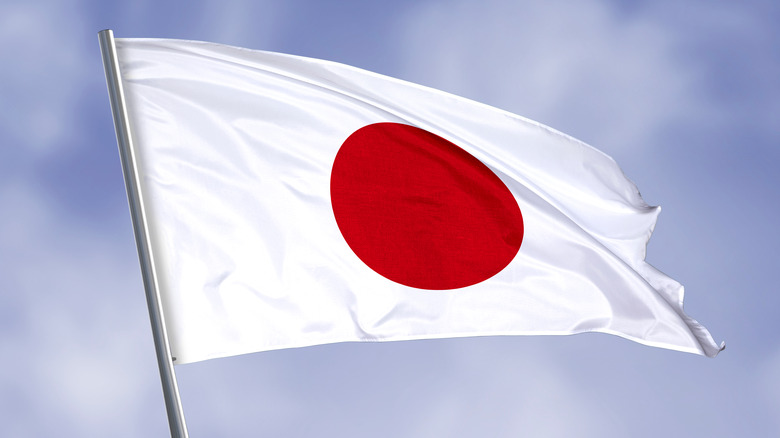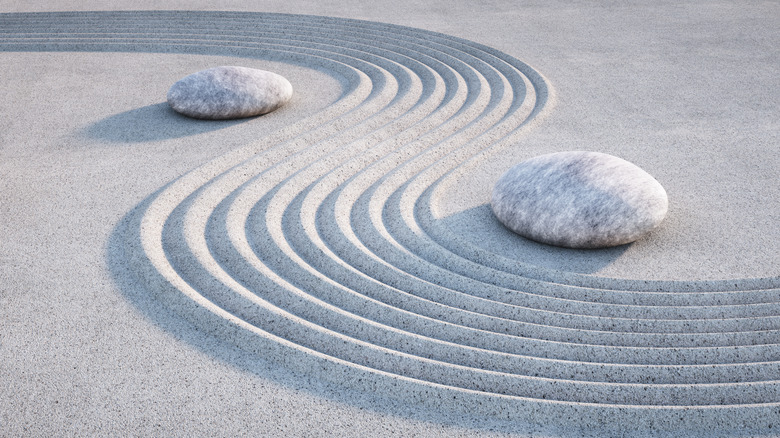What Is Japanese 'Wabi Sabi,' And How Can You Use It To Embrace Imperfection?
In the U.S., the "American dream" is widely accepted as the image of success. It is an ethos that prides itself on upward mobility and autonomy. While there are many positive things that have come from this, there are also many downsides. It encourages people to work tirelessly for greater acclaim, constantly seek the bigger house and buy the fancier car. Regarding material wealth and career success, you could say the philosophy goes something like "the more, the merrier." How your belongings compare to your neighbors' determines your value.
This sense of individualistic materialism is one of the greatest differences between Western and Eastern philosophy. Per the BBC, Eastern philosophy generally errs on the side of "collectivism," as opposed to Western "individualism." Collectivism is the tendency to look at things as an interconnected whole rather than splintered into parts. This philosophy promotes less competition between people and greater unity. One particular Japanese philosophy that branches from this foundation is known as "wabi sabi."
The history of 'wabi sabi'
In an article investigating "wabi sabi," the BBC remarks that it first appeared as a concept in Taoism, the Chinese philosophy founded by Lao Tzu. In Taoism's foundational text, "Tao Te Ching," Lao Tzu emphasizes the importance of accepting the many flaws of life. Tzu writes, "True perfection seems imperfect, / yet it is perfectly itself. / True fullness seems empty, yet it is fully present. / True straightness seems crooked ..." Lao Tzu believed that many of the things we try to fix or improve are actually already whole and good.
According to Stanford's Encyclopedia of Philosophy, Japan began embracing these minimalistic ideas in the 1400s. After national war destroyed their aristocracy, people were no longer interested in the glamorous, ornate goods that the upper class had previously flaunted. Instead, they began turning towards Taoism's appreciation for the simple and naturally flawed. As a result, "wabi sabi" was popularized.
The meaning of 'wabi sabi'
In an entry titled "Japanese Aesthetics," SEP translates "wabi" to "simple, austere beauty" and "sabi" to "rustic patina." "Wabi" praises emptiness, while "sabi" honors decay. Interestingly enough, empty and decay are two words that, in the American vernacular, are typically considered negative characteristics. However, in Japanese culture, these two qualities add value rather than retract it. In his book "Wabi Sabi Simple," Richard Powell remarks that "Wabi-Sabi nurtures all that is authentic by acknowledging three simple realities: nothing lasts, nothing is finished, and nothing is perfect."
In valuing "sabi" or aged things, this philosophy finds importance in every step of someone or something's journey. A rusted metal statue or memories of your mistakes are two examples of "sabi" that enrich and enliven the present. An example of "wabi" would be the silence of solitude or the bareness of winter. In keeping with "wabi," rather than viewing these as bleak, one would acknowledge the insight that quiet brings and the natural beauty of the seasons.
Perfectionism vs. 'wabi sabi'
In stark contrast to "wabi sabi," the media often leads us to believe that overabundance is the goal, and that lack is the enemy. When we are insistent that we must always be striving for more, we create infinitely high expectations for ourselves, leading to perfectionism. Recent studies have proven that many people are currently struggling with this issue.
A study published by the Psychological Bulletin found that over the past few decades, there has been a 10% increase in perfectionism among young Americans. Unfortunately, though, as "wabi sabi" aims to suggest, life is fraught with "imperfection." In fact, the BBC reports that, in Taoism, death is synonymous with perfection. This is because perfection implies that everything is complete and there is no room to grow. However, the defining characteristic of life is that it is always changing. As a human being living in this world, perfection is an impossible task and thus a straight shoot to anxiety and disappointment.
How 'wabi sabi' can help heal perfectionism
Rather than rejecting faults and deficiencies, "wabi sabi" embraces and even celebrates them. Tanehisa Otabe, a professor at the Institute of Aesthetics at the University of Tokyo, told the BBC that "wabi sabi leaves something unfinished or incomplete for the play of the imagination." With "wabi sabi," you find a sense of peace with the things that you cannot change, knowing that many of the things that are broken or desolate are already fulfilled and beautiful. Training your mind to exercise its curiosity and creativity, you discover your own unique sense of excitement and admiration in the mundane.
In his book "Wabi-Sabi For Artists, Designers, Poets & Philosophers," Leonard Koren writes "Wabi-sabi means treading lightly on the planet and knowing how to appreciate whatever is encountered, no matter how trifling, whenever it is encountered. 'Material poverty, spiritual richness' are wabi-sabi bywords." With this philosophy in mind, common causes of stress will relinquish. You can begin to accept that you and your life are good enough. Just as shadows are an essential part of a beautiful painting, shortcomings and challenges are essential parts of a beautiful life.
Steps you can take to begin practicing 'wabi sabi'
If you are someone who struggles with perfectionism, you likely know it's very difficult to shut off. Overcoming perfectionism is a process. Elizabeth Scott, PhD, an award winning writer on stress management and positive psychology, writes with verywellmind that you likely aren't even aware of the perfectionist thoughts causing you anxiety. With that in mind, beginning a practice of mindful meditation may help you to become more conscientious of your headspace.
Popular meditation teacher Tara Brach told The New York Times, "The purpose of mindfulness meditation is to become mindful throughout all parts of our life, so that we're awake, present and openhearted in everything we do." Scott recommends that you begin recording your negative self talk and pessimism when it comes up. Once you look over this criticism, you can incorporate your knowledge of "wabi sabi," reflecting on the beauty that you may be failing to appreciate and welcoming the imperfections you are rejecting.





